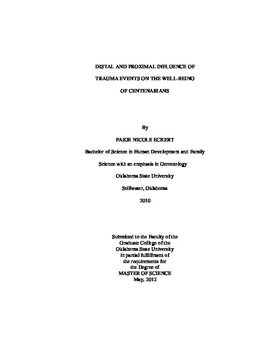| dc.description.abstract | Data for this study included N = 154 centenarians (Mage = 101.01, S.D. = 1.72) residing in Oklahoma. Majority of participants were female, Caucasian, widowed, and having obtained a college education. The primary purpose of this study was to explore how reported lifetime traumatic experiences of extremely long lived persons influence well-being. A key objective was to identify the association between distal and proximal occurrence of cumulative lifetime trauma as well as the effects of perceived health, economic security, and social support on current life satisfaction. Participants reported experiencing an average of 2.07 (S.D. = 1.39) traumatic events during their lifetime. They also reported events to have occurred the most often greater than 70 years ago. Natural disasters were reported to have occurred most often. After controlling for age, gender, race, education, marital status, perceived health, economic security, and social support, cumulative traumatic events encountered before age 30 (β = -.25, p < .01) as well as after age 89 (β = -.20, p < .05) were negatively associated with life satisfaction. In particular, past and recent traumatic events seem to decrease life satisfaction among centenarians. Perceived health (β = .20, p < .05), economic security (β = .20, p < .05), and social support (β = .34, p < .001) all maintained direct positive associations with life satisfaction. This suggests that greater perceived health, economic security, and social support occurring in old-old age increases life satisfaction. Results indicate that lifetime trauma has a distal as well as contemporaneous association with life satisfaction at 100 years of age and beyond. Evidence from this study has implications relative to guiding how geriatric health professionals and practitioners address quality-of-life among long-lived trauma victims. | |
